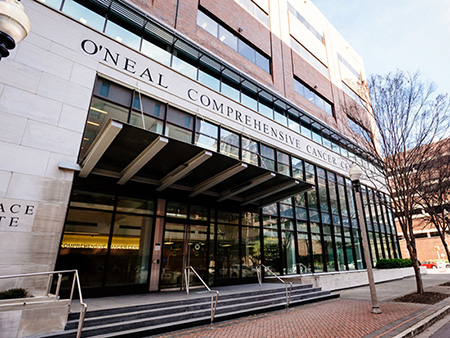 This digital solution will help doctors offer patients timely genetic testing for hereditary cancer, greater clinical support and counseling, coupled with shorter wait times and more counselors to expand into other clinical areas when needed.
This digital solution will help doctors offer patients timely genetic testing for hereditary cancer, greater clinical support and counseling, coupled with shorter wait times and more counselors to expand into other clinical areas when needed.
(Photography: Andrea Mabry)The O’Neal Comprehensive Cancer Center at the University of Alabama at Birmingham is partnering with My Gene Counsel, a digital health company that provides innovative genetic counseling solutions, to support hereditary cancer genetic testing.
This state-of-the-art digital solution will enable physician-initiated testing, greater clinical support and better use of genetic counseling resources.
My Gene Counsel will deliver pre-test education for patients, as well as pre- and post-test Living Lab Reports® for patients and clinicians. These online reports provide in-depth genetic counseling information that updates over time. Institutional partners, such as the O’Neal Cancer Center and their patients, will now benefit from accurate, timely information and long-term engagement facilitated by My Gene Counsel’s tailored content and notifications.
“As a genetic counselor, I have been up against the typical challenges of in-person and telehealth models, in which genetic counseling can become a bottleneck in the testing process,” said Meagan Farmer, M.S., CGC, MBA, genetic clinical operations director at My Gene Counsel and clinical genetic counselor at UAB. “I see a patient once, disclose their results by phone, and send a counseling letter to the patient and their physician. I rarely have the opportunity to speak with that patient or their referring physician again.”
Historically, this has resulted in genetic testing delays, and in the field as a whole, there has never been a mechanism to provide new information and guidance on a broad scale as knowledge evolves to include new cancer risk information, medical management guideline changes and the reclassification of the meaning of genetic variants.
“I could not keep every patient or referring physician updated on these critical genetic advances over time,” Farmer said. “This partnership addresses these pain points and is a game-changer for UAB, UAB patients undergoing genetic testing and the physicians who care for them.”
In addition to allowing for timely genetic testing for patients, the improved workflow will reduce genetic counseling wait times and allow genetic counselors to expand into other clinical areas in which they are needed.
My Gene Counsel’s digital genetic counseling solution will soon launch within UAB’s Breast Health Center to enable responsible and efficient oncologist-initiated genetic testing for breast cancer patients. UAB then intends to leverage My Gene Counsel’s technology throughout their broader Cancer Service Line to ensure that valuable, but often scarce, clinical genetics resources are used wisely.
“When you consider precision medicine in oncology, genetic testing has become increasingly important in developing tailor-made treatment plans for cancer patients,” said Helen Krontiras, M.D., medical director of the UAB Multidisciplinary Breast Clinic. “My Gene Counsel’s digital genetic counseling tools will enable us to coordinate genetic testing at point-of-care, allowing for more efficient genetic testing while patients are in clinic and more timely cancer treatment. Our patients look to us for guidance, and these innovative tools will give us the clinical support we need to have more engaged discussions with them about the short- and long-term implications of their genetic test results.”
UAB’s previous workflow required all patients undergoing genetic testing to interact with a genetic counselor before and after testing. With the addition of My Gene Counsel’s comprehensive digital genetic counseling content, only patients who test positive will automatically be referred to a genetic counselor.
“The O’Neal Comprehensive Cancer Center is a national leader in advancing cancer treatment, engaging communities in cancer prevention and early detection, and supporting current and future cancer physicians,” said Barry Sleckman, M.D., Ph.D., director of the O’Neal Cancer Center. “We understand that better integration of genetic testing, as well as long-term patient and physician engagement, is critical to our success. This partnership with My Gene Counsel will allow us to take cancer precision medicine initiatives to the next level.”